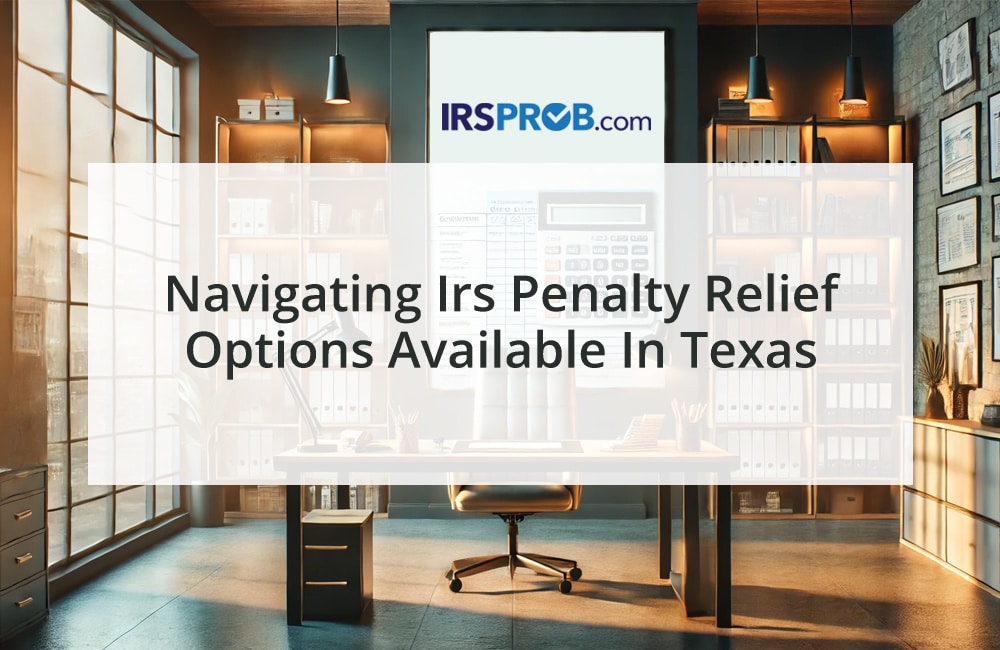Navigating the complex landscape of taxes can be overwhelming for many individuals and businesses in Texas, particularly when it comes to dealing with IRS penalties. If you’ve found yourself facing fines or interest due to late filings or payment errors, seeking IRS penalty relief in Texas might be your best option. Understanding the relief options available can alleviate some of the stress while potentially saving money. Tax laws and the IRS’s nuanced requirements can lead to challenges that appear insurmountable. However, by exploring IRS penalty relief options, Texans can find a pathway to rectification. Whether you’ve made a genuine mistake or faced unprecedented circumstances that led to the difficulties, understanding these relief measures can offer a lifeline. This article will dive into what IRS penalty relief is, why it matters, and how the process works. Additionally, we’ll provide some pro tips, answer your most pressing questions, and discuss how IRSProb can assist you in navigating these challenging waters.
Understanding What IRS Penalty Relief Means in Texas
IRS penalty relief is a program by the Internal Revenue Service designed to assist taxpayers who have been penalized due to late filings or payments. The relief options can include waiving penalties, which are often charged as a percentage of your tax debt. For example, suppose a small business in Texas missed the filing deadline due to a natural disaster. In that case, they might qualify for penalty relief, sparing them additional charges on top of their existing tax obligations. Alternatively, an individual might find themselves saddled with penalties after making an honest error in their tax calculations. Relief programs aim to help such taxpayers avoid further financial strain. To qualify, there typically needs to be reasonable cause for the delay or error. Understanding these complexities can make the difference between financial relief and ongoing debt pressure.
Why Understanding IRS Penalty Relief Options Is Crucial in Texas
The implications of not exploring penalty relief options can be significant. They can manifest in serious financial distress, especially for those already struggling. For instance, one common scenario involves a small business owner in Dallas who inadvertently failed to pay their quarterly taxes on time due to cash flow issues. As a result, they incurred significant penalties, further exacerbating their fiscal challenges and threatening their business continuity.
Another common scenario might involve a recent college graduate in Austin who miscalculated their income and claimed incorrect deductions on their tax return. The resulting penalties could set them back significantly, affecting their ability to move forward financially while burdening them with long-term debt. In yet another instance, consider an individual in Houston dealing with a medical emergency who filed late due to unavoidable circumstances. With penalty relief, such situations can alleviate additional financial burdens while providing peace of mind during challenging times.
- Facing unexpected fines can often lead to financial setbacks, as illustrated by fictitious scenario 1, with potentially long-lasting consequences.
- In scenario 2, penalties may cause additional burdens for individuals or families already in a delicate financial state.
- Scenario 3 highlights that the stress of accruing debt from penalties can also impact businesses and their growth prospects substantially.
The Steps to Follow for Seeking IRS Penalty Relief in Texas
- Step 1: Determine Your Eligibility. Assess whether your situation qualifies for penalty relief, focusing on factors such as natural disasters or unavoidable errors.
- Step 2: Gather Documentation. Compile any relevant documents that can support your case, such as medical records or business financial statements.
- Step 3: Apply to the IRS. Ensure your application is detailed and accurately reflects your circumstances, enhancing the possibility of a favorable outcome.
Pro Tips for Successfully Managing IRS Penalty Relief Cases in Texas
Common Queries Regarding IRS Penalty Relief in Texas
How IRSProb Assists Clients Effectively
IRSProb brings a wealth of experience in assisting clients with navigating the intricate world of tax penalties and relief options. Operating with a focus on client well-being, their services offer comprehensive support, from evaluating potential relief options to advocating on behalf of clients directly with the IRS. By streamlining the communication process and providing expert advice, IRSProb alleviates worries associated with potential penalties. The experienced team can offer tailored strategies, ensuring that each client’s unique circumstances are considered while providing peace of mind throughout the complex resolution process.
Summary of Key Insights into IRS Penalty Relief Options in Texas






